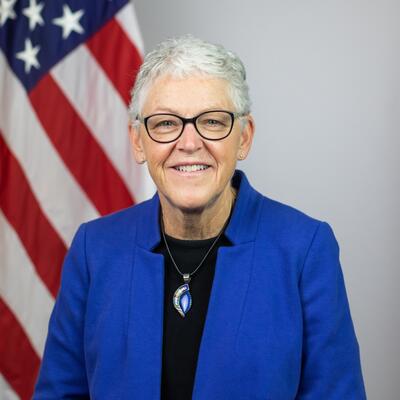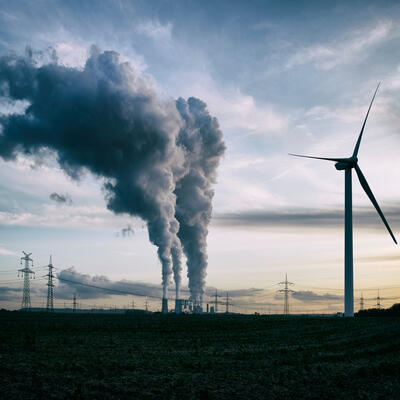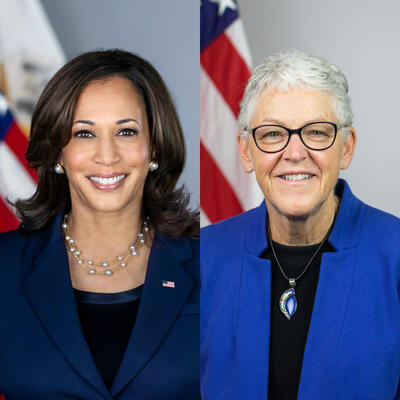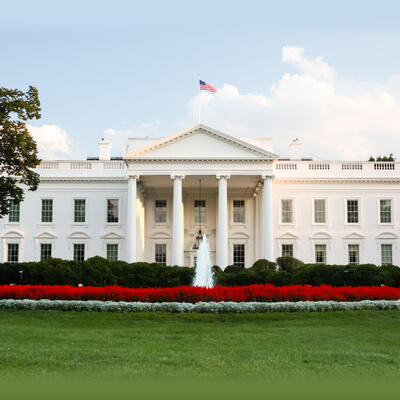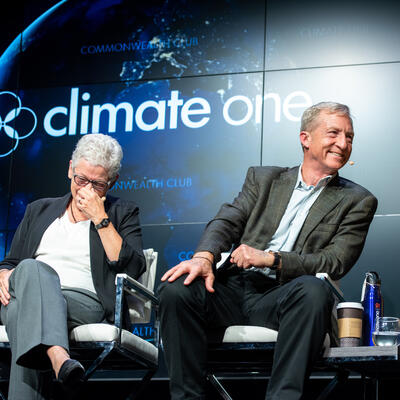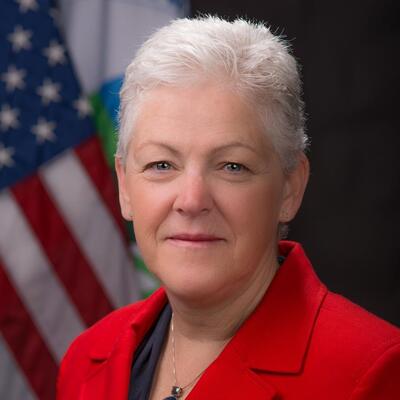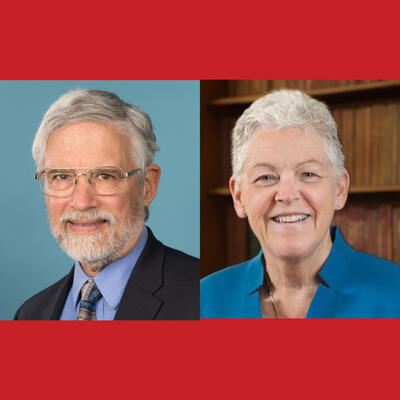
Climate One at Harvard With Obama’s Climate Team
Guests
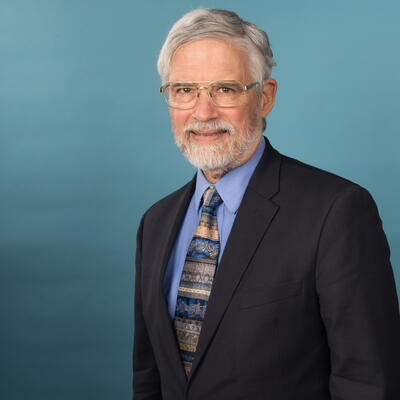
John Holdren
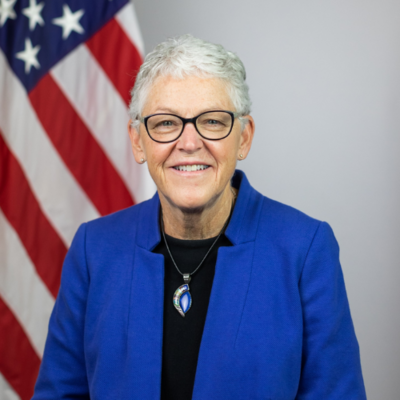
Gina McCarthy
Summary
With the Green New Deal in the national spotlight, a vigorous debate is happening: how ambitiously and broadly must the U.S. act on climate? Are issues like economic equity, job security and public health outside the frame of climate action — or fundamental to its success?
Greg Dalton welcomes two key members of President Obama’s climate team: former White House Science Advisor John Holdren and former U.S. EPA Administrator Gina McCarthy, in a special program recorded at the Harvard T.H. Chan School of Public Health in Cambridge, Massachusetts.
Full Transcript
Announcer: This is Climate One, changing the conversation about energy, the economy, and the environment.
Gina McCarthy: It took 40 years to convince people that cigarette smoking was actually bad for your health. We don’t have 40 more years.
Announcer: Former EPA Administrator Gina McCarthy wants to reframe the climate crisis as a public health issue.
Gina McCarthy: It’s your doctor, or it’s your nurse, or it’s medical professional organizations, starting to step up and say this is no less a challenge for you than cancer.
John Holdren: The biggest uncertainty is what we decide to do.
Announcer: Former White House Science Advisor John Holdren believes solving that issue is up to us.
John Holdren: We have agency. We have the opportunity to act and to drastically reduce the risks that we face going forward.
Announcer: Gina McCarthy and John Holdren. Up next on Climate One.
Announcer: Climate One conversations – with oil companies and environmentalists, Republicans and Democrats – are recorded in front a live audience. I’m Greg Dalton. Climate One recently travelled to Cambridge, Massachusetts to record a special program at the Harvard T.H. Chan School of Public Health with two environmental champions.
Gina McCarthy: I am tired of a debate about climate change as if we’re sacrificing or giving up anything to address it.
Announcer: Gina McCarthy served as US EPA Administrator under President Obama in his second term. She now directs the Harvard’s Center for Climate, Health and the Global Environment. McCarthy sees climate change as a public health issue that involves everyone -- especially communities most impacted by pollution from fossil fuels.
John Holdren: There is no silver bullet. I say that so often that some of my colleagues are calling me Silver Shotgun Holdren. We need silver buckshot -- we need to do a lot of things at once.
Announcer: John Holdren was President Obama’s Science Advisor and Director of the White House Office of Science and Technology Policy. He’s currently the Teresa and John Heinz Professor of Environmental Policy at Harvard Kennedy School of Government.
I began our conversation at Harvard by asking Gina McCarthy for her views on the ambition, aspiration, and practicality of the Green New Deal and other calls for climate action since the 2018 midterm elections.
Gina McCarthy: I think the Green New Deal was a wake-up call. I'm here at Harvard and these students are they’re impatient with the lack of progress that's happened. They’re upset about the inequities and the injustices involved in climate change. And they are really interested in making the case that health and climate go hand-in-hand. Climate change isn’t about polar bears, it’s us and our kids it's our health today, it’s about their future. And the Green New Deal brought a level of energy and enthusiasm to this issue. I don’t think it was intended to be if we don't get there first, we don't get there at all. It was really intended I think that the values that we all should share. And I think for many years I know that the obligation the Environmental Protection Agency was to protect public health and natural resources and to do it in a way which didn't destroy the economy but supported it. Why all of a sudden can’t climate change solutions do exactly the same thing. And so I'm excited about it. I understand that it's a bunch of stretch goals and I think AOC and Senator Markey clearly understand that but it was a wake-up call to everybody who thinks incrementalism is going to be enough. We know it isn't.
Greg Dalton: AOC was really the key, you know, her charisma, her charm really brought it forward and she's been told by some people kind of tone it down. So there's maybe a gender aspect to that. How do you see that what she’s told kind of --
Gina McCarthy: You think people would pat her on her head and say go back to the kitchen honey. I don’t know. Clearly she ran on a campaign she won overwhelmingly she's representing the interests of her constituencies. The last thing in the world I would ever want to do is to tell someone who work that hard and was that enthusiastic that they need to calm themselves down and fit into the mold of a Congress that hasn't been effective for quite a while. So I’m kind of interested in seeing how this shakes out. Clearly, I want climate change to be addressed and I want movement forward and I've been in government for 40 years. I know change doesn't happen overnight but I’m quite sure that AOC and Senator Markey knows that as well. They’re setting a stretch goal so that we can wake up and start doing something, and I'm excited about it.
Greg Dalton: John Holdren your take on aspirational excitement or overreach.
John Holdren: Well, I think actually it's a little bit of both, but not to the detriment of the overall debate. I think the vision the sense of urgency the commitment the ambition in the Green New Deal are all highly beneficial. I think it was intended all along to be a clarion call for a desperately needed national debate on climate change rather than a blueprint for exactly where we need to be at exactly a specific time. I think the biggest worry I have about it is that by lumping together both the measures we need to take to address climate change, both in mitigation emissions reductions and adaptation to the changes in climate that we can no longer avoid lumping that together with a whole set of other really splendid aspirational goals. A decent job for everybody, a decent education for everybody. Decent housing for everybody. Decent medical care. Those are all highly desirable goals, but by lumping them all together in one package I fear that they actually make the climate change problem itself look harder than it actually is. That is if people get the idea that we can only address climate change, if simultaneously, we achieve all of these other laudable goals then they will think climate change is even harder than it is. What we need to do in climate change is already hard but it's doable and it's doable at I think not just a modest economic cost, but ultimately an economic gain. And this is one of the points that is really not widely enough understood because Republicans in particular love to talk about the costs of addressing climate change and they don't talk about the benefits. They don't talk about the jobs they don’t talk about the new technologies they don't talk about the climate damage averted the damage that climate change will do to the economy if we don't fix it. And when you take everything into account addressing climate change looks like an economic winner not a loser. And again the trouble is, if you think we need an enormous jobs program and enormous social safety net, because climate change is going to cause all these economic stresses I think that's a misimpression. And that's one of the reasons I worry about the comprehensiveness of the way they do, but again I think it is really very clear that AOC and Senator Markey and others who supported this idea are throwing down the gauntlet. They’re saying it's time to have a serious argument about the pace of progress that we need to get our arms around this challenge. And by the way, these other challenges which are linked in some ways to the climate change challenge would also be good to get on with. I just expect in the end that we won't actually see legislation that puts all of these pieces together. I believe that we can make the economic arguments as well as the physical science and biology and public health arguments to get a consensus on that sooner rather than later. I think that’s very important.
Greg Dalton: Gina McCarthy I’ve interviewed a lot of environmental justice advocates as you know, last time we were together we were with a very powerful one. And if I put myself in her shoes hearing what John Holdren said is like okay let me deconstruct that which a coastal elite white person is telling me people of color still need to wait. There is an environmental justice critique that okay what you're saying is we have to, you know, not now wait your turn. We've been told that for centuries were tired of waiting it’s urgent we want economic justice and wealth distribution now as part of this. Don't tell us we have to wait.
Gina McCarthy: John, clearly you didn’t say that. But I understand what Greg is asking. And one of the reasons why I’m at the School of Public Health is that and this is something that John help to frame when he was in the White House is that, you know, greenhouse gases are carbon pollutants. We've checked pollution before we have to kick this, right, we have to deal with it. But pollution is not an equal opportunity killer. It goes after the young it goes after the elderly it goes after the low income it goes after the minorities.
Greg Dalton: Disproportionally.
Gina McCarthy: That’s my point. And so if you connect climate and health you will automatically first think of the communities that are most vulnerable to get the benefits from climate action that's what you need to do. You can’t let equity be the afterthought it needs to be the driver of change. That's why when you look at something like the Green New Deal clearly you’re not looking for a piece of legislation that does everything all at once. But the issue is that there are 104,000 people earning a good living in wind power today that’s 240,000 people. So I am tired of a debate about climate change as if we’re sacrificing or giving up anything to actually address it. Instead of recognizing that climate change is real, John Holdren, who was the smartest guy I know in this said we can lick it. It means money. It means investment. So make sure that investment is in health protections today on your way to a sustainable future because it will be a more just future. And why isn't that exactly what the Green New Deal intended let’s not be stupid about the actions we take let’s get two first, three first, four first, that’s hard to say. Without spitting on John it’s actually really hard to say.
John Holdren: You missed.
Gina McCarthy: Thank you. Good. I tried my best I guess. So this is kind of the energy that we need is that we have been falsely provided of ridiculous conversation first that it wasn't real then it may be real but we shouldn't do anything about this because it’s too expensive. And John is right, climate change is a risk to our health today. It’s exacerbating all the health challenges we have, it's killing our children and our elderly first, it’s keeping people in poverty when we have an ability to invest in climate actions that completely turn that around that’s what it's all about. And I think we have failed miserably to entice people with what a climate future looks like how does it avoid the pitfalls of today.
John Holdren: I think that's absolutely right. And the key point that Gina has been making and I would want to underline is that addressing climate change is by its nature progressive. First of all because the poor are the most afflicted by the damages from climate change. Secondly, because addressing climate change will create jobs that lift up the economy and lift up the people in need of additional employment. But thirdly, if we finally have the wit to put a price on the offending emissions which simply brings into the balance sheet of producers and consumers. The cost that otherwise they were imposing on the whole society without seeing in their own economic decision. If we just have the wit to do that and then rebate the money on a per capita basis which by the way is what Alaska does with its oil revenues, its oil royalties rebated on a per capita basis. And that's a progressive measure as well. So we should not be accepting the burden of this argument that somehow addressing climate change is gonna hurt the poor or it's going to be regressive. There is a potential swindle in the notion that a carbon tax will fix everything. I don't think a carbon tax will fix everything.
Gina McCarthy: I know you don’t, John.
John Holdren: But the swindle is that a carbon tax at the level that is likely to command political support at this point might be $30 a ton of CO2 that would have a big impact on coal burning. It would have some impact on natural gas burn but we have no impact on automobiles because $30 a ton of CO2 translates to $.30 a gallon of gasoline. And that's why the argument is wrong.
Gina McCarthy: Also less than the tax we put on a pack of cigarettes.
John Holdren: And the price of gasoline goes up and down by $.30 a gallon in a week for reasons nobody can explain with both hands above the table. So the idea that $.30 a gallon on gasoline is going to cause people to carpool or take public transportation ride their bike instead or buy an electric car is just not right. And that's why we should not accept the notion that if the Congress gives us a carbon tax we have to do away with regulation that's crazy. We should not do away with fuel economy standards we should not do away with appliance standards we should not do away with building standards, but a carbon price on top of that would be helpful.
Gina McCarthy: That would be nice.
Announcer: You’re listening to a Climate One conversation recorded at the Harvard TH Chan School of Public Health, with former EPA Administrator Gina McCarthy, and former White House Science Advisor John Holdren. Coming up, we’ll hear more about making health and prosperity the basis for climate action.
Gina McCarthy: Fossil fuels served a purpose. It underpinned our economy, we now know that it's both dangerous to continue to rely on it and we have a better way to actually energize ourselves and a better way that produces a healthier and more just future. We have to grab that.
Announcer: That’s up next, when Climate One continues.
Announcer: This Climate One program was recorded at the Harvard TH Chan School of Public Health. I’m Greg Dalton, and my guests are John Holdren, former Science Advisor to President Obama, and Gina McCarthy, former EPA administrator, now Director of Harvard’s Center for Health and the Global Environment. Given the Health School setting, I asked Gina McCarthy what she thought about the parallels between the fossil fuel and the tobacco industries, and whether there was any possibility of oil companies acknowledging the harm caused by their product -- perhaps even agreeing to pay damages.
Gina McCarthy: I don’t see it, you know, and it's just climate change is just more difficult. It took 40 years to actually convince people that cigarette smoking was bad for your health, we don't have 40 more years. And so I need people engaged in understanding this. Tobacco the simple message was smoking kills don't smoke. Okay, well there’s no inherent value with tobacco and it never has been. So that’s a pretty nice neat little thing to be able to say. You can’t do that with climate. When we say fossil fuels kills when it does when you burn it does when you start destroying the planet in our ecosystems. It's not we’ll shut it off. There is this fossil fuel served a purpose it underpinned our economy, we now know that it's both dangerous to continue to rely on it and because of, you know, thankfully lots of investment in the alternatives we have a better way to actually energize ourselves and a better way that produces a healthier and more just future. We have to grab that. That is a very not smoking kills don't smoke discussion. And so we need to ground it and we need to be positive and we need people to run towards a better future. And that means we need to actually reduce and eventually eliminate fossil fuels in our economy, and that's not just burning it. That's going into the plastics that are killing our ocean which is all oil-based that's going into the synthetic chemicals that produce the pesticides that we rely on for factory farming and industrial farming which we can no longer rely on to feed 10 million people because that means cutting down forests that hurt the climate. These are complex systems questions which neatly put into a slogan anywhere.
John Holdren: Just to underline one part of Gina's point. The world still depends on fossil fuels. Coal and oil and natural gas for 80% of its primary energy for two thirds of its electricity the United States still depends for all you've heard about wind and solar and maybe nuclear and hydropower and biomass 85% dependent on coal, oil and natural gas. As much as we would like to we cannot change that overnight we absolutely have to change it. We have to move to a much greater reliance on renewables. We have to see if we can fix nuclear to the point where it could play a role in taking a bite out of the carbon problem. We have to emphasize energy efficiency but I think we’re also gonna need carbon capture and sequestration. We’re gonna need to learn to affordably capture the carbon dioxide from the smokestacks of power plants because no matter what else we do we’re gonna be burning fossil fuels for decades to come in declining quantities, but we’re still going to be burning fossil fuels. And we've got to get emissions basically to zero before the end of the century. And that requires that we have what President Obama used to call an all hands on deck approach we need every sensible measure we can think of. Because again today 80% global dependence on fossil fuels that's very hard to get off. We have to transition as rapidly as we can away from that extraordinary dependence on fossil fuel.
Gina McCarthy: And that is real with policies and regulations and laws really have to provide the right signal to the market about what people are going to be buying and what we should be investing in. And that's the challenge that I mostly, well, I have many challenges with this administration let's be honest. That’s the major one on climate is they have confuse the market signal. They have allowed other countries to actually move far ahead of us in terms of the developing of the clean solutions we need moving forward. And that's gonna damage the ability of the United States to be the strongest country.
Greg Dalton: John Holdren, you mention carbon capture and sequestration. Billions of dollars have been spent on trying to develop that technology. The Bush administration pulled the plug on one project. Some people think that that's kind of a red herring to preserve the business model of fossil fuel companies they can keep burning. So how much money needs to be invested in breakthrough technology to capture carbon from smokestacks and tailpipes because some people think that it’s really not gonna happen.
John Holdren: It better happen because if it doesn't I believe that we will have an almost impossible task of meeting the aim for example, to reduce the original aim the aim in the Obama administration reduce U.S. emissions by 80% by 2050. Doing that without carbon capture and sequestration is gonna be very, very hard. I wouldn't say impossible, a scientist, technologist should never say impossible if it doesn't violate fundamental laws of nature but it will be very, very hard. And progress is being made on carbon capture and sequestration. There are now responsible folks who are saying that the best technologies now available or that would become commercially available very shortly could capture and sequester a CO2 for about $45 a ton but they see potential for getting down to $25 a ton. And if carbon capture and sequestration cost $25 a ton that's within the range of a carbon fee or a carbon tax that might be politically palatable. And then we'd see that stuff going in all over the place. That is not a substitute for expanding wind for expanding solar for expanding sustainably grown biofuels and of course it doesn't fix the transport sector. Because we’re not gonna put carbon capture and sequestration on vehicles and we’re not going to run Boeing 747s on batteries. So we need additional technologies to address those parts of the problem. But again, I don't think we should leave anything off the table. We should be investing in optimizing every technology that has the potential to reduce emissions and then we pick the best ones and deploy them as fast as we can.
Greg Dalton: Do American taxpayers have the appetite to spend billions of dollars on something that may not turn out?
John Holdren: We should. We’ve been spending billions of dollars for decades trying to make fusion energy work and it still doesn't work. I worked on fusion energy --
Gina McCarthy: I’m gonna tell Ernie Moniz you said that.
[Laughter]
John Holdren: -- in the late 60s still doesn't work. Fusion doesn't work. The best fusion machines require more energy than they produce. But the idea that there's a single silver bullet whether it's wind or photovoltaics or energy efficiency there is no silver bullet. I say that so often that some my colleagues are calling me silver shotgun Holdren. And we need silver buckshot we need to do a lot of things at once because as Gina has already said we have wasted a lot of time. People asked me, right, as the Paris Accords were agreed. They said oh you must be ecstatic you worked so hard on getting these Paris agreements, aren’t you very happy? And I said, yeah, I’m happy but I would've been a lot happier if we had done this 25 years ago. Because in my judgment, we knew enough in 1990 to justify all of the measures that we agreed in Paris and we lost a quarter of a century, in part because of the misinformation and the muddying of the water that advocates of the status quo, fossil fuel industry, Republicans who were afraid of government overreach and regulation. They muddied the water enough that we lost a quarter of a century and we cannot lose another quarter of a century or we will be cooked.
Greg Dalton: If you’re just joining us, I’m Greg Dalton at Climate One at the Harvard T.H. Chan School of Public Health. My guests are Gina McCarthy former Administrator of the U.S. EPA and Director of the Center on Climate Health and the Global Environment at Harvard T.H. Chan School of Public Health. And John Holdren former White House science advisor to President Obama and the Teresa and John Heinz Professor of Environmental Policy at the Harvard Kennedy School of Government. Gina McCarthy, a lot of action in the courts lately. One District Court in Alaska overturned the Trump administration executive orders saying that banning opening up drilling in the Arctic Wildlife Refuge exceeded the president's authority. Another one federal court in Wyoming halted oil and gas drilling saying the government must account for climate impacts. Your take on what's happening in the courts on climate.
Gina McCarthy: This administration is losing. I think it has like a 6% success rate in the courts on what they’ve been doing with environmental and natural resource assets. Listen, what’s happening here is not different than what happens with this president right now is that he just doesn't respect the process. These things are getting blown out, you know, not because of the substances much is because they're not doing the process right. And we're in the United States of America there’s a process for engaging the public there’s a process for getting comment. There are things you need to do to prove that regulation or other permit and other decisions are the right thing to do. And it's called transparency it's called science it’s called real data it’s called real analysis, it’s called engagement and outreach. They don’t do any of that. Hence, the challenge this administration has is they came with the things to-do list and that wasn't to strengthen democracy. The things to-do list was the outcome and unfortunately for them and fortunately for the breathing public is that they have not been able to say that we got the science wrong. We did the analysis wrong. We didn't do the outreach. In fact we did all those things in spades. So they can't figure out in a substantive way following the process to get rid of all of the actions that the Obama administration took on climate in traditional air pollutants. So instead they’re just going to the end and cutting out the process. And the court simply won't abide by that and none of us should in the democracy. We’re supposed to have a say there’s supposed to be a way to engage. We’re supposed to know what's going on we’re not supposed to deny the science in the face of real science telling us something different. So I'm extraordinarily pleased that the courts are looking at these things, but the challenge we face is why should we have to sue our federal government on everything they do in order to protect ourselves, our health and our democracy. It's insulting to have a to-do list that's written by somebody that doesn't want the world to be healthier and safer. I don't get it. That's not a Republican criticism that's not how Republicans think. I've worked for Republicans, they like to breathe clean air. And I think they prefer the planet to be around for our kids, do you know what I mean, or our kids to be around on the planet is probably a better way.
Greg Dalton: And speaking of kids, one of the big cases is Juliana versus the United States. First filed under the Obama administration, now the Trump administration. That's one of the thing that's there's been you strikes children walking out of high schools around the country. How is that energize, you know, obviously we’re here on a college campus that's always the case. This is broader and younger now. It’s not college students, it’s high school students around the world inspired by Greta Thunberg.
Gina McCarthy: She’s awesome. Is she not awesome? Kids today are just amazing. That particular case is another case in point. It's like a green new day case basically when they started the case where the kids were suing the federal government for not protecting their future essentially and claiming that they're all impacted by climate change and making the case. Every lawyer said, oh that’s ridiculous, you know you can't take that route. And now all of a sudden they're all gone, hmm, I wonder.
Greg Dalton: Female judge in Oregon who said -- yeah.
Gina McCarthy: It’s proceeding and I think that it’s a wake-up call and I think you see the fossil fuel industry getting very nervous about their liability with the various losses that’s happening at state levels in particular New York, which has a real sort of a strong case if you will in terms of New York law. And so there is a real I think willingness now to test the means and mechanisms of making actions flow. And I think it's young people who are refusing to follow within the lines that picture doesn't involve them right now it doesn't protect them. So they’re scribbling all over the place that's creating a dynamic situation which you clearly want to land and progress on. But it's so much better than what it was two years ago, seriously because it's just the energy and the enthusiasm is moving forward. Do I want a president that respects climate and moves forward in a Congress that acts, that's the outcome I'm looking for but I don't have that right now so I'll take the energy.
Greg Dalton: And one reason I think John Holdren those kids have touch people there's an emotional a moral level. So much of the climate conversation is cerebral intellectual chemistry and physics, it's abstract those children walking out. So I’d like to hear from you about how you know your time in the White House and elsewhere. The role of the social sciences and having a human emotional conversation because spewing facts for several decades, you know, it got so far but there's limits to spewing facts.
John Holdren: Let me tell you first of all that the kids while they are full of energy and passion and commitment they are also armed with the fact. I mean one of the nice things about the Juliana case is while the silver haired attorneys might've said, you can’t do it this way, the silver haired scientists participated. There’s many of our most senior climate scientists wrote the briefs and armed those kids with the facts and I've talked to a number of those kids and they know the facts. And so they are appropriately armed not just with passion and commitment but they know the arguments they know the impacts they can make the case that climate change is already harming all of us it's harming life, health, property economies ecosystems, they can make those arguments. And they can make the argument that if we do not change course it’s gonna get worse and it's gonna be their generation that suffers even more than current generations are suffering. So they are a great force for good they are breath of fresh air, but they are not just passion and emotion. Now on the inclusion of the social science dimension in the considerations of climate change in the Obama administration. One of the things we did from the beginning because Obama understood that this is an issue that we can only address with insights from all of the disciplines from the social sciences from the natural sciences from engineering from law. We transform the U.S. Global Change Research Program which 13 agencies, including EPA including NASA, including NOAA, 13 agencies $2.7 billion a year and we brought in social scientists in numbers in order to add this human dimension of global environmental change. How people think about it why they do what they do. What kinds of incentives would cause them to do different things to change in ways that would improve the situation. We had a behavioral and social sciences team in the White House, led by one of my employees in OSTP a brilliant young neuroscientist. And that team was extraordinarily effective in bringing to bear the most current insights from social and behavioral sciences on government challenges. So we made a big deal of that I'm afraid that there are somewhat less of that going on now, although I think under suitable bureaucratic cover parts of that team are still in place. Not everything going on in the administration --
Gina McCarthy: Don’t out them now, don’t out them.
John Holdren: Yeah, we shouldn’t out them. But I do wanna say I mean we said a lot of critical things about the Trump administration and they deserve. But the important thing at least and important thing is that there are many dedicated public servants in the government career folks who are still doing their best to get useful things done. They've a terrible handicap in terms of who's at the top of the pile. But there are still good work being done in the U.S. Global Change Research Program there's good work being done in the bowels of the Department of Energy. We have a Department of Defense which still understands that climate change is a major national security challenge and is trying to take appropriate action. So we need to support and encourage the sensible forces that are still present in government while we do everything we can with states with cities with communities with the grassroots.
Gina McCarthy: We don’t need to get angry. We need to get active.
Announcer: You're listening to Climate One, recorded at Harvard’s T.H. Chan School of Public Health, with former Obama Science Advisor John Holdren and former EPA Administrator Gina McCarthy. Coming up, we’ll talk about the mental health aspects of coping with extreme weather and a disrupted climate.
John Holdren: How do you avoid depressing people? You tell them at the end it's up to us. We have agency we have the opportunity to act and to drastically reduce the risks that we face going forward.
Announcer: That’s up next, when Climate One continues.
Announcer: This is Climate One. I’m Greg Dalton, and my guests are former White House Science Advisor John Holdren and former US EPA chief Gina McCarthy. As Director of Harvard’s Center for Health and the Global Environment, I wanted to ask Gina McCarthy about climate and mental health -- not just the stress of experiencing extreme weather, but also the sadness and grief that might come with thinking about living with climate uncertainty.
Gina McCarthy: There’s a tremendous amount of work now being done on the mental health issue. It cannot be dismissed it's much larger than anybody thought. There’s actually PTSD happening after these wildfires and not just the people involved in them but watching it on the television. It's distressing to see and that’s why it's extremely important that we explain to people that they can be protected and there is hope for the future. I really worry about the young people, you know, and what the vibes they get from us. So it's extremely important that we look at these issues and we address them. But we do it in a way that leads them to an understanding that they can participate in the process and we can make change. And we need to recognize that there are many risks associated with climate that we have to anticipate and we have to adapt for. We have to think about where homes are being built whether they are in flood zones or whether they are in areas that are at extreme risk of wildfire damage. We have to think about how we prepare for that and respond to it and keep people safe. But recognize that it doesn't end when the fire is out, you know, it is really I think a pressing issue. And how you talk to your kids about it matters, you know, we never want to hand anybody any child a problem that we can encourage them to help solve. And so I think a lot can be done. We are going to lose some ground and we are and it's challenging to live with the rollbacks that I'm seeing. That’s hard for me. So for 10 minutes I scream and yell and then I get over it and you just keep plugging forward. That's how progress gets made. No one ever said life is gonna be easy.
Greg Dalton: John Holdren, you grew up in San Mateo, California, the county in California that has the greatest risk exposure to sea level rise. I’d like to take you to that, you know, a place where you grew up to your youth. What are you concerned about what do you remember the beauty of that place and what are you worried about?
John Holdren: Well, when my parents moved with me as a four-year-old to San Mateo in 1948 there were 30,000 people in San Mateo. Now there are about 85,000 houses have covered the hills that were formally covered with oak trees and grass. Foster City was built on a gigantic landfill which is in danger as sea level rises of being completely flooded out. But I don't confine my focus to the place that I grew up. I think about what a meter of sea level rise is likely to mean to Mumbai, to Shanghai to Boston to Washington DC to London. Based on my reading of what we’re understanding about Antarctica what we’re understanding about Greenland what we’re understanding about the pace of temperature rise which produces thermal expansion and contributes to sea level rise. Based on all of that, I think it is at least plausible that we would see a meter by 2050 and 2 meters. And 2 meters by the way is near the upper end of NOAA's estimate by 2100. I mean our National Oceanic and Atmospheric Administration says we can see 2 meters by 2100.
Gina McCarthy: When you say NOAA I thought you’re talking about the Noah.
Greg Dalton: Yeah, Noah’s Ark.
Gina McCarthy: The guy with the ark. Sort of the same conversation.
John Holdren: But again the single, most important uncertainty about the future of climate change is what we decide to do. You know there's a lot of hand-wringing and the models aren’t perfect the forecasts aren’t perfect. We’re not sure how much sea level rise will be by 2050 or 2100. The biggest uncertainty is what we decide to do if we take as a society sensible but aggressive action to reduce emissions and to build resilience, preparedness, adaptation we need both. If we do that, we can drastically reduce the future damages that will otherwise be in for. And that’s the message I put at the end of every talk I give publicly about this. You say, well how do you avoid depressing people, you tell them at the end it's up to us. We have agency we have the opportunity to act and to drastically reduce the risks that we face going forward from climate change.
Greg Dalton: Gina McCarthy.
Gina McCarthy: Greg, can I just, you know, you can't carbon capture. You don't need to take carbon out of the emissions from an electric vehicle. If you asked me 20 years ago, whether people would have electric vehicles or ones that could drive themselves, I would have told you to just go watch a sci-fi movie, right. Life changes, think about the way the United States of America is today compared to where we were 50 years ago on the first Earth Day. The progress we've made is startling the innovations we can bring to the table today are happening every single day and we snooze about them. Well get those innovations to come in the area of climate I don't need to know to be confident about what our path exact path is to get to the levels of reductions that science demands. I just need to know that we’re willing to try. I just need to know that we’re not discouraged we don't lack hope that we still want to innovate and I need to show the young people today that innovation change has made the world a better place. We can also make it a safer place for our kids if we had that same attitude. And so I listen to John and the science and I get it. But that is never going to be nor is it for John the end of the story. Someone has given us a challenge just go for it.
Greg Dalton: What are the areas that you see the most exciting progress. Offshore wind is now taking hold in the United States, is it battery storage and density. What gets you really excited where you don’t quite know about yet that can be a big breakthrough?
John Holdren: Well, first of all there are a lot of things we do know about. We've seen sharply declining cost of photovoltaics sharply declining cost of wind they will decline further with big offshore wind farms. I will tell you one of the most encouraging things I recently heard. We had a visit from the Indian Minister of Power. The Minister of Power of the second largest population in the world, the largest democracy in the world, India, accompanied by the head of the biggest and most important energy and climate think tank in India. And they agreed that by 2026, India will be building no more coal-fired power plants because by their own projections wind and solar with storage will be cheaper than coal, 2026 in India, mind you. Same thing is happening in China and when you say where do you go for encouragement I go to China, I go to India I go to Europe I go to the Arctic countries because we have a big Arctic initiative where the climate change in the Arctic is twice as fast as is in the rest of the world all kinds of consequences. And what I find is people all over the world have come to the conclusion that climate change is real, it's already harming us it's going to do more and less than until we get our arms around it. And they are finding ways to get their arms around it that is the biggest breakthrough. The breakthrough in human understanding optimism initiative innovation to deal with the challenge. I think we’re going to see big further breakthroughs in electric vehicles we’re gonna have electric cars that go 300 miles on a charge and they charge in 10 minutes. Yeah, it’s now up to what 250, it’s gonna be 300 miles and they’re gonna charge in 10 minutes and you’re gonna be able to drive across the United States up and down the country to Alaska if you want in your electric vehicle. And then we just have to be sure that the electricity is generated in ways that aren’t wrecking the environment. I mean Gina is right, the electric car doesn't emit any pollution, but the power plants many of them still do. In fact one of my late colleagues, a pioneer in energy efficiency, Lee Schipper, once said we don't have zero emission vehicles we have elsewhere emission vehicle and we got to fix that too but it’s gonna happen, it’s going to happen. We are going to have a much cleaner electricity system, a much cleaner transportation system. We’re gonna have more efficient buildings. The Woods Hole Research Center which I had the privilege of directing for a few years before I went into the Obama administration, has a building that is beautiful that is functional and that is basically a zero net energy building. It's got photovoltaics on the roof it’s got a wind turbine on the site and it generates more electricity than it uses. That's gonna be the standard for buildings in the future tremendous opportunities.
Gina McCarthy: I agree with John it's so exciting when you go outside the United States and you see what's happening in the real world and people's interest in looking at the future and driving towards it, you know, really moving it. But it's also the saddest thing in the world for me to have to leave the country to get that feeling of hopefulness, that's got to change.
John Holdren: Yeah, but you can also go to California where there are some extraordinary things happening.
Gina McCarthy: Massachusetts is pretty cool too.
John Holdren: And Massachusetts is pretty cool too.
[Laughter]
And so is Wisconsin and so is New York.
Gina McCarthy: Things are changing.
John Holdren: Things are changing there are places in this country that are doing extraordinary things on climate change.
Greg Dalton: Let’s go to our audience questions invite you to join us here at Climate One. So, yes. Please wait for the microphone so we can be sure to capture.
Female Participant: I want to address Gina McCarthy. I find you extraordinarily inspiring and also very accessible. And I want to know would you come talk to my Board of Health who don’t seem to recognize that climate in Gloucester, but I'm not the only one I mean all of the boards of health not even --
Gina McCarthy: I’m just wondering because I was a Board of Health agent at the early part of my career. I love that job.
Female Participant: Yeah, and it's a very powerful job but ours and several others I know do not seem to recognize climate as a health risk.
Gina McCarthy: Yeah.
Female Participant: Will you talk to them?
[Laughter]
Gina McCarthy: I’ll do the best I can to talk to anybody who wants to talk to me.
Greg Dalton: So help lags. People think about climate is polar bears, but it is not yet, if you ask a person on the street human health, Zika, whatever it is doesn't come to mind fast enough and you're gonna work on that I think.
Gina McCarthy: I am going to desperately try to do that. This is what we’re doing at C-Change, the center that I have because we are talking to this administration mostly about transportation. And looking at the new transportation in climate initiative that is being worked out and it's 10 states or 9 or 10 states and it's really a terrific opportunity to think about subnational work that can be really influential. But what we’re doing is really number one trying to translate the science and language that people can understand and grab but really personalize it. And part of the work we’re doing with partners across the country is to really put a face on climate change it's just not had it, you know, the face has been really a polar bear. And if that polar bear shows up in another climate meeting.
Greg Dalton: You’re gonna get your gun?
Gina McCarthy: I’m gonna chase it out if I can possibly do that. Because really, you know, one of the exciting things in my life is that I have a grandson now and he’s like seven months old and he's the cutest thing ever. And if you want a face of climate change you can borrow him because he’s mine.
[Laughter]
And I have a granddaughter coming in the end of June and I'm just, it’s so important for us to make our children the face of what we do and what we work for. There isn't a parent anywhere that I know who, if they saw a bus flying down the middle-of-the-road and their kid standing in the way of that bus they wouldn't do everything humanly possible to save them. That’s the kind of attitude we need to make. And even in New England we see drastic changes in terms of what our climate looks like. We lost cranberry bugs how long ago they’re now in Montréal for crying out loud, you know, well maybe not downtown Montréal but they’re there. And we have Lyme disease that levels that nobody anticipated and it's not a joke it can debilitate young people for the rest of their lives. And we have to get medical professionals involved, which is one of the reasons why we exist is to connect dots like this get the healthcare community engaged figure out how we prepare for climate change that's already we know is happening and going to continue but also get trusted advisors to talk to people about climate. So aside John Holdren or me, but it’s your doctor or it’s your nurse or it’s medical professional organizations starting to step up and say, you know, this matters. This is no less a challenge for you than cancer or Alzheimer's disease because, frankly, they're all related to one another and it's a future that we can get rid of those things if we move forward. So health matters it's gonna matter and that’s a driver for change.
John Holdren: And there’s progress being made on this. I mean one of the things that I would notice late in the Obama administration we convened in the White House the Deans of most of the country schools of medicine, schools of public health and schools of nursing to talk about including in the curricula of these schools courses on climate change and health. So that the trusted physicians and nurses and public health specialists if they turned out would be able to talk to their patients about climate change and health.
Gina McCarthy: We have a biweekly sort of what do you call it a fact sheet or whatever or webpage that goes out and gets updated by great people sitting in this room and it’s called the climate optimist. Take some time and read it because that’s the only thing that we can do to tackle a long-term problem like this is to everyday wake up and say we can do it. And that's what this climate optimist is all about. So go to C-Change, take a look at it. (01:06:08)
Greg Dalton: Let’s go to our next question before they have to get out the door. Yeah, next question please here at Climate One at Harvard University today.
Female Participant: Thank you for all that you’ve said today. I have a question about the town at the town level. We’ve talked about individuals we’ve talked about the federal government. We’ve talked about the state, but a lot of us are working within our communities as a community at the town level. And I guess my question is what are the most powerful steps that a town can take?
Gina McCarthy: Well, you know, when I started in this job actually that’s where we started was at the community level. I mean there were great things and what we started to do is to just develop a climate action plan for your own community. It started with and we talked about this the last time we were together is municipal buildings are extraordinarily inefficient. Get folks who don't have a job trained to do the work to update every municipal building. Go to your schools, and schools are the unhealthiest buildings usually the ones least able to keep their kids awake and learn figure out what's going on there and make some changes. Bring solar energy to your school so kids can see it working. That's what gives them hope is to have a concrete example. Figure out how you get bike lanes figure out how you recycle and actually have the recycled material go to someplace to be recycled.
John Holdren: And if you’re a coastal community figure out what sea level rise is going to do in your community and how you can adapt to it, and how the city planners need to take into account what sea level is going to do.
Gina McCarthy: I mean at one point, everything happened at the community level. Since when did we want to divest our ability to shape our own communities. That's why I think it is an ability for you to go out, hang out together form groups be annoying to people who don't recycle. They annoy the heck out of me, you know. And if a person says, I'm an environmentalist I recycle, tell them well good for you what else do you do? Do you know what I mean, think about it, get electric charging stations throughout the community. Get bike groups together and make sure that there’s safety in numbers. Make your kids walk to school and accompany them. These are things we used to do that get back in the natural world. Understand that you’re part of it and you have to control it and be part of it and recognize when your control isn’t there. You have to give the world its due. We are just overtaxing the world that we live in we have to stop it. And the best way to do it is one little community at a time.
Music: In
Announcer: Gina McCarthy, former head of the US EPA under President Obama, speaking at the Harvard T.H. School of Public Health, where she directs the Center for Health and the Global Environment. We also heard from John Holdren, former Science Advisor to President Obama, and now the Teresa and John Heinz Professor of Environmental Policy at the Harvard Kennedy School of Government.
To hear all our Climate One conversations, subscribe to our podcast at our website: climateone.org, where you’ll also find photos, video clips and more. If you like the program, please let us know by writing a review on iTunes, or wherever you get your podcasts. And join us next time for another conversation about energy, the economy, and the environment.
Climate One is a special project of The Commonwealth Club of California. Kelli Pennington directs our audience engagement. Tyler Reed is our producer. Sara-Katherine Coxon is the strategy and content . The audio engineers are Mark Kirchner and Justin Norton. Anny Celsi and Devon StroloΩvitch edit the show. The Commonwealth Club CEO is Dr. Gloria Duffy. I’m Greg Dalton. Climate One is presented in association with KQED Public Radio.
Climate One is presented in association with KQED Public Radio.
Music: Out
